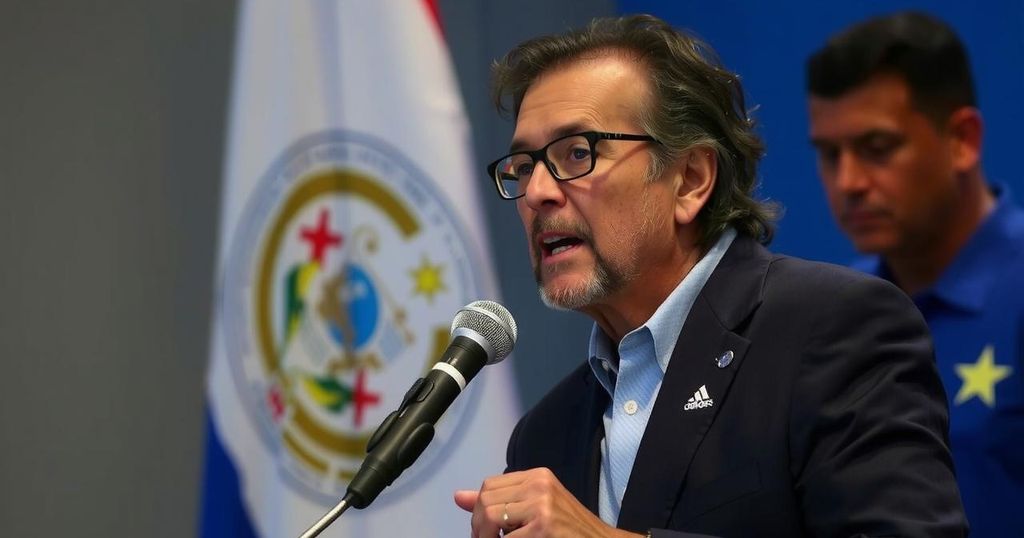Yamandú Orsi Elected as President of Uruguay in Historic Leftist Victory

Uruguay elected leftist candidate Yamandú Orsi as president, marking the return of the Broad Front after five years in opposition. Orsi secured 49.8 percent of the votes against Álvaro Delgado. His victory comes amid rising childhood poverty and organized crime challenges, where he promotes a pragmatic approach to governance.
Yamandú Orsi has been elected President of Uruguay following a closely contested runoff election. His victory marks the return of the Broad Front party to power, which governed for 15 years prior to losing to the center-right National Party in 2019. Orsi, a former history teacher and two-time mayor, received 49.8 percent of the votes while his opponent, Álvaro Delgado, garnered 45.9 percent. With voter turnout nearly reaching 90 percent, the election reflects significant public participation as mandatory voting is enforced in the country.
Delgado, who conceded defeat, expressed bittersweet sentiments, stating, “With sadness, but without guilt, we can congratulate the winner.” Current President Luis Lacalle Pou, constitutionally prevented from seeking another term, congratulated Orsi and committed to ensuring a smooth transition of power. Looking ahead to his inauguration on March 1, 2025, Orsi promised to prioritize national unity in the wake of a fiercely fought election.
Orsi’s prior experience in administration and previous governance by the Broad Front laid the groundwork for his campaign. Significant poverty reduction occurred during the Broad Front’s last tenure from 2005 to 2014, achieving a World Bank-reported drop in poverty rates from 39.9 to approximately 4.6 percent. Notably, former President José Mujica’s progressive reforms from 2010 to 2015 contributed to this legacy, establishing Uruguay as a model for leftist governance in Latin America.
Positioning himself as a moderate, Orsi emphasized the need to promote a balanced approach that combines welfare programs with market-friendly policies. He stated, “The country of liberty, equality and fraternity has triumphed once again,” articulating his vision for a cohesive society. His administration will be challenged by rising childhood poverty rates and the growing presence of organized crime gangs. Additionally, he aims to reassess trade relations previously established by the outgoing administration with China.
Political analysts attribute Delgado’s defeat to a lackluster campaign primarily focused on criticizing Orsi’s party without presenting a compelling alternative vision. Orsi’s victory underlines the shifts within Uruguayan politics as citizens seek leadership that reflects their diverse needs and aspirations.
The election results in Uruguay signify a pivotal shift in the political landscape, with the left-leaning Broad Front party reclaiming power after five years in opposition. This election follows a series of global trends where opposition candidates prevail against established governments. Orsi’s commitment to tackling issues such as poverty and organized crime will be vital in his efforts to unify a divided populace, following a time characterized by economic challenges and rising crime rates in the nation.
Yamandú Orsi’s election as President of Uruguay heralds the return of the Broad Front party, emphasizing a need for unity and continuity in governance. His administration will likely focus on social issues and economic revitalization, building upon previous successes in poverty reduction. The outcome of this election reflects a significant public desire for change and highlights the ongoing evolution of political dynamics in Uruguay.
Original Source: www.newsweek.com







